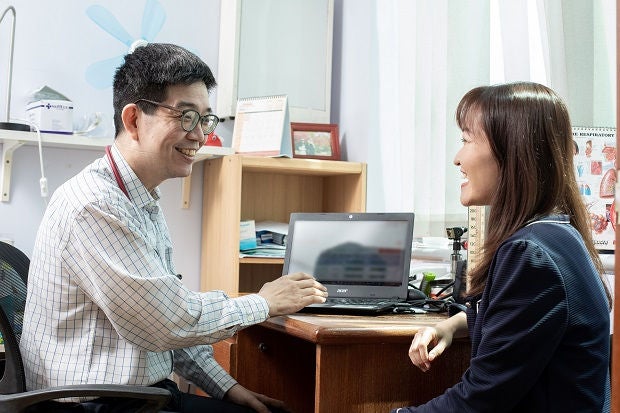
A new SingHealth initiative connects healthcare providers for a smoother patient journey and enhanced continuous care from neighbourhood to hospital.
To refer their patients to Singapore General Hospital (SGH) specialists, general practitioners (GPs) can either call or email the hospital to make an appointment. The patient then attends his appointment, with a physical copy of his referral letter. After examining the patient, the SGH specialist might order blood tests and other investigations, and the patient then needs to return for another appointment to review the results and receive the management plan.
To facilitate this process, SGH launched a SingHealth service in late 2022 known as Partners Buddy to allow GPs to directly access the SGH appointment system and to upload relevant medical information. This approach allows patients to have more timely care, and also saves them time and costs.
“Partners Buddy operates as a web-based communication platform that allows GPs to refer patients to specialists seamlessly,” said Dr Emily Ho, Senior Consultant, Departmentof Endocrinology, and Director of PHICO (Population Health and Integrated Care Office) – Clinical Networks, SGH.
“With this system, we can establish a vital closed-loop communication between them that ensures a smooth transition of care back to their primary GP.”
With the Partners Buddy system, the patient does not have to wait days for an SGH appointment date to be confirmed, as the clinic can do so while he is with his GP. The GP or his assistant can directly select the available appointment dates to book the most suitable date and time on SGH’s clinic appointment system. The patient also does not have to worry about losing or forgetting to bring his GP’s referral to his appointment, as his GP will key in details of his medical condition to be viewed by the SGH specialist in the hospital clinical system.
An administrative module is available where dedicated hospital triage teams can view the referrals ahead of the appointment and arrange for relevant scans or tests to be done before the consultation, further saving time and costs for the patient.
This open plan strengthens communication and fosters a seamless continuum of care between hospital specialists and GPs. Both the specialist and GP can discuss the patient’s diagnosis, treatment and general condition on the system in real time, and the SGH clinic can discharge the patient back to their referring GP.
Encouraging patients to return to the care of their GPs post-specialist treatment is especially beneficial for those who need ongoing and coordinated care with their chronic conditions. “Partners Buddy allows the GP to track the patient’s journey from the day the appointment is made until he is discharged,” said Ms Hilda Ng, Assistant Director, PHICO – Clinical Networks, SGH.
SGH piloted the programme with selected departments, and this helped the team to fine tune the system. Partners Buddy was then rolled out to the rest of SGH and other SingHealth institutions, including Changi General Hospital, Sengkang General Hospital, KK Women’s and Children’s Hospital, and National Heart Centre Singapore, said Dr Ho, the SGH lead for the project.
For a broader network of care, the team engages GPs island-wide to be involved in Partners Buddy. “Our GP engagement team actively reaches out to share its advantages and features, while also guiding GPs and their key clinical staff on using the platform,” said Ms Ng Hwee Sian, Assistant Manager, PHICO – Clinical Networks, SGH.
With 124 clinics and 175 GPs on board as of August 2023, feedback on the advantages that Partners Buddy brings towards clinical care has been positive.
This approach is useful for elderly patients, who may forget to tell their caregivers about their upcoming appointments. With Partners Buddy, the identity of caregivers or next-of-kin can be entered into the system for notification purposes. “Previously, there were a lot of phone calls between the clinic, the hospital and the patient, but this makes it faster and easier to support the patient and their caregivers,” said Ms Hilda Ng.
Ongoing feedback from users aids the Partners Buddy team in improving its features. With an ageing population and the prospect of greater complexity of care needed for chronic conditions, the Partners Buddy team aims to broaden and harmonise healthcare in its network. This could translate to new or improved features that capture the patient’s journey across multiple disciplines and institutions should their treatment plan require the expertise of various specialists or other healthcare partners.
“The primary use of Partners Buddy is currently for GPs to refer patients to specialist centres, but we can also look at it as a system for the future, where patients can refer to other services, such as allied health, community services, or where patients can be referred from these services back to their GP. We are looking into the expansion of Partners Buddy over subsequent phases,” said Dr Ho.
Echoing the sentiments for Partners Buddy to augment an expansive and integrated healthcare landscape, Ms Hilda Ng added: “This is why the programme is called Partners Buddy — healthcare is not just limited to hospitals or GPs, but also community services, for example, as there are many partners that make up healthcare.”
Get the latest updates about Singapore Health in your mailbox! Click here to subscribe.













 Get it on Google Play
Get it on Google Play